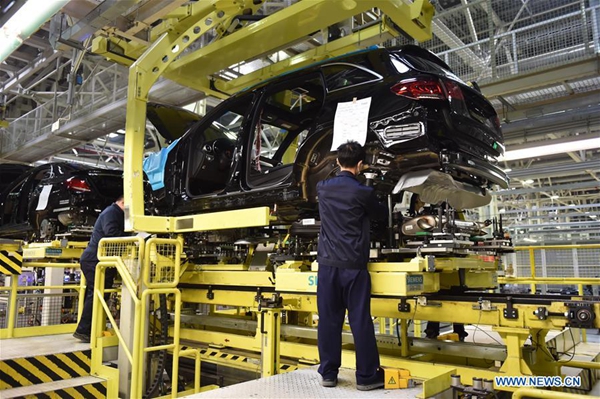
A staff member works at a facotry of Beijing Benz Automotive. Co., Ltd. in Beijing, capital of China, Feb. 21, 2020. The company has resumed production amid strict prevention and control measures against the novel coronavirus. [Photo/Xinhua]
The new coronavirus outbreak has become a global concern since it emerged in Wuhan, Hubei province, in December 2019.
Facing the daunting task of containing its rapid spread, China is working with the international community proactively, and has introduced a series of strict measures to prevent the epidemic continuing to spread worldwide.
Such protective policies have been proved to be effective as the number of confirmed cases outside Wuhan has fallen for 12 consecutive days as of Feb. 16. China’s efforts and responsible attitude toward global health and safety have received praise of the World Health Organization (WHO) and many parts of the world.
However, some analysts are worrying that the viral outbreak in China, the “world factory”, will have serious negative impacts on the global economy.
It is undeniable that the epidemic has negatively impacted the Chinese and even the global economy in the short run. For example, consumer industries such as catering, tourism, entertainment and logistics suffer much from the measures to contain the outbreak. Also, the manufacturing industry, especially the automobile sector, may suffer some losses caused by the delayed resumption of production, which may disrupt global supply chains to some extent.
However, we must understand that these negative effects are just temporary.
First, the Chinese government is introducing various measures to deal with the difficulties and challenges facing the enterprises, small- and medium-sized ones in particular, such as increasing financial support, lowering taxes and fees, stabilizing the labor market and stimulating production capacities.
Second, China is a big economy with strong economic resilience, huge manufacturing potential and ample room for economic maneuver. The impact of the epidemic will not change the fundamentals of China's long-term economic growth.
As more and more factories start resuming production, it will ensure the stability of international trade and capacity cooperation. The global supply chain will soon overcome any temporary disruption with the resumption of work and production to accelerate the construction of key overseas projects, and further promote the stability of the global supply chain.
Third, looking back at epidemic-related events in the past half century, such as MERS or SARS, they have not had a significant negative economic impact. Certainly, commodity prices are sensitive to any short-term disruption, this will soon disappear. The world stock and capital markets are already rising again after a short decline.
People should be confident that the spread of the virus can be successfully contained soon, and the negative economic effects are just short-term. The lost economic output caused by the outbreak will be offset by the increased economic activities in the second quarter and the rest of this year.
He Shuquan is a professor from School of Economics, Shanghai University.
Opinion articles reflect the views of their authors only, not necessarily those of China.org.cn.
If you would like to contribute, please contact us at opinion@china.org.cn.




